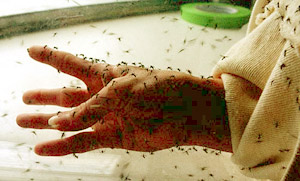
Courses Taught
ENTO 8250 Insect Physiology (syllabus)
ENTO 8570 Molecular Entomology (syllabus)
Funding
National Institutes of Health
United States Department of Agriculture
Research Collaborations
Michael R. Strand, Entomology, UGA
Overview
Reproduction in female insects encompasses a highly regulated sequence of behavioral and physiological processes that result in the production of eggs. As in all other animals, peptide hormones provide precise regulation of these processes along with other types of hormones during reproduction. The primary objective of my research program is to characterize the structure and function of peptide hormones and their receptors involved in the regulation of key reproductive processes in mosquito species. Species of primary interest are vectors of different human and animal pathogens: the yellow fever mosquito, Aedes aegypti, and the malaria mosquitoes, Anopheles gambiae and An. stephensi.
 They are exceptional model systems because each successive cycle of egg maturation begins with a blood meal and ends with egg deposition three to four days later. Blood provides females with nutrients that are invested in the yolk of eggs and in metabolic storage for survival to initiate another cycle. Understanding the regulation of nutrient use and reproduction in mosquitoes will give us insight into how pathogens, such as malaria, filarid worms, and viruses, ingested in a blood meal from an infected host, can develop or multiply in the female’s body and be transmitted to a different host, many days later.
They are exceptional model systems because each successive cycle of egg maturation begins with a blood meal and ends with egg deposition three to four days later. Blood provides females with nutrients that are invested in the yolk of eggs and in metabolic storage for survival to initiate another cycle. Understanding the regulation of nutrient use and reproduction in mosquitoes will give us insight into how pathogens, such as malaria, filarid worms, and viruses, ingested in a blood meal from an infected host, can develop or multiply in the female’s body and be transmitted to a different host, many days later.
Our research also has a comparative aspect. We are investigating how the hormonal regulation of reproduction in mosquito species that do not require a blood meal for egg production (autogeny) differs from those that do (anautogeny). Autogenous species of interest, Georgcraigius (Aedes, Ochlerotatus) atropalpus and Toxorhychites amboinensis, mobilize nutrients stored during the larval stages to invest in eggs. Thus we seek to understand how the endocrine system regulates larval molting, metamorphosis, and nutrient storage in response to microbes, food, and changes in the aquatic environment, in collaboration with Michael Strand and his associates. Results from this work may provide insights into better ways to control mosquito populations in the field.
Our research contributes to two concepts shared by insect and vertebrate endocrinology. First, peptide hormones, as chemical messengers, are highly conserved both in structure and function across the phyla of multicellular animals. Second, the nervous and digestive systems of animals use these messengers to coordinate metabolism and homeostasis, so that development and reproduction can occur. The elucidation of key regulatory pathways in mosquitoes can lead to the discovery of stable and functional peptide mimics or to genetic transformation that may offer new ways to prevent their development or block pathogen transmission.
Current Research Interests (selected publications listed below)
Insulin-Like Peptides (ILPs)
In vertebrates, insulin and related peptides are important growth factors and multifunctional hormones. This family of peptide hormones is structurally conserved across higher invertebrates and all insect groups. Up to eight ILPs are encoded in the genome of different mosquito species, which leads to the questions: why are so many ILPs present in a mosquito and what do they do? We identified the receptor and signal pathway for ILP3 in Ae. aegypti and showed that it regulates different tissue-specific processes in sugar and blood fed females. Now we are working to define the expression, function, and signaling of the different ILPs in Ae. aegypti and other species and life stages.
Ovary Ecdysteroidogenic Hormone (OEH)
This neuropeptide is the functional equivalent of follicle-stimulating hormone and luteinizing hormone in vertebrates. OEH was isolated from Ae. aegypti adult head extracts based on its indirect activation of egg maturation in blood-fed decapitated females and direct stimulation of mosquito ovaries to secrete ecdysteroid hormone. In turn, this hormone activates and maintains the production of yolk proteins, which are stored in mature eggs and used during embryonic development. OEH is present in all mosquitoes examined to date and appears to be the primary factor activating egg production in anautogenous and autogenous species. Recently, we discovered the receptor for OEH and its signal pathway and now are seeking its function in larvae and a better understanding of its interactions with ILPs in the regulation of reproduction and other physiological processes in adult mosquitoes.
Selected Publications
McKinney, D. A., Strand, M. R., and Brown, M. R. 2017 Evaluation of ecdysteroid antisera for a competitive enzyme immunoassay and extraction procedures for the measurement of mosquito ecdysteroids. General and Comparative Endocrinology 253:60-69.
Strand, M. R., Brown, M. R., and Vogel, K. J. 2016 Mosquito peptide hormones: Diversity, Production, and Function. Invited review. Advances in Insect Physiology 51:145-188.
Gulia-Nuss, M., Elliot, A., Brown, M. R., and Strand, M. R. 2015 Multiple factors contribute to anautogenous reproduction by the mosquito Aedes aegypti. Journal of Insect Physiology 82:8-16.
Coon, K. L., Vogel, K. J., Brown, M. R., and Strand, M. R. 2014 Mosquitoes rely on their gut microbiota for development. Molecular Ecology 23:2727-2739.
Vogel, K. J., Brown, M. R., and Strand, M. R. 2013 Phylogenetic investigation of peptide hormone and growth factor receptors in five dipteran genomes. Frontiers in Endocrinology 4:193.
Brown, M. R., Sieglaff, D. S., and Rees, H. H. 2009. Gonadal ecdysteroidogenesis in Arthropoda: occurrence and regulation. Annual Review of Entomology 54, 105-25.
Telang, A., Frame, L., and Brown, M. R. 2007. Larval feeding duration affects ecdysteroid levels and nutritional reserves regulating pupal commitment in the yellow fever mosquito Aedes aegypti (Diptera: Culicidae). Journal of Experimental Biology 210: 854-864.
Telang, A., Yiping, L., Noriega, F. G., and Brown, M. R. 2006. Effects of larval nutrition on the endocrinology of mosquito egg development. Journal of Experimental Biology 209: 645-655.
Sieglaff, D. H, Duncan, K. A., and Brown, M. R. 2005. Expression of genes encoding proteins involved in ecdysteroidogenesis in the female mosquito, Aedes aegypti. Insect Biochemistry and Molecular Biology 35: 369-514.
Riehle, M. A., Garczynski, S. F., Crim, J. W., Hill, C. A. and Brown, M. R. 2002. Neuropeptides and peptide hormones in Anopheles gambiae. Science 298: 172-175.
Insulin-Like Peptides
Nuss, A. B. and Brown, M. R. 2017 Isolation of an insulin-like peptide from the Asian malaria mosquito, Anopheles stephensi, that acts as a steroidogenic gonadotropin across diverse mosquito taxa. General and Comparative Endocrinology available online at https://doi.org/10.1016/j.ygcen.2017.05.007.
Antonova, Y., Arik, A. J., Moore, W., Riehle, M. R., and Brown, M. R. 2012. Insulin-like peptides: Structure, Signaling, and Function. In: Gilbert, L. I., (Ed.), Insect Endocrinology, pp. 63-92. Elsevier/Academic Press, New York.
Marquez, A. G., Pietri, J. E., Smithers, H. M., Nuss, A., Antonova, Y., Drexler, A. L., Riehle, M. A., Brown, M. R., and Luckhart, S. 2011. Insulin-like peptides in the mosquito Anopheles stephensi: identification and expression in response to diet and infection with Plasmodium falciparum. General and Comparative Endocrinology 173:303-312.
Gulia-Nuss, M., Robertson, A. E., Brown, M. R. and Strand, M. R. 2011. Insulin-like peptides and the target of rapamycin pathway coordinately regulate blood digestion and egg maturation in the mosquito Aedes aegypti. PloS One 6 (5): e20401.
Wen, Z., Gulia, M., Clark, K. D., Dhara, A., Crim, J. W., Strand, M. R., and Brown, M. R. 2010. Two insulin-like peptide family members from the mosquito Aedes aegypti exhibit differential biological and receptor binding activities. Molecular and Cellular Endocrinology 328:47-55.
Brown, M. R., Clark, K. D., Gulia, M., Zhao, Z., Garczynski, S.F., Crim, J. W., Suderman, R. J., and Strand, M. R. 2008. An insulin-like peptide regulates egg maturation and metabolism in the mosquito Aedes aegypti. Proceedings of the National Academy of Sciences USA 105: 5716-5721.
Riehle, M. A., Fan, Y., Cao, C., and Brown, M. R. 2006. Molecular characterization and developmental expression of insulin-like peptides in the yellow fever mosquito, Aedes aegypti.Peptides 27: 2547-2560.
Krieger, M. B. J., Jahan, N., Riehle, M. A., Cao, C., and Brown, M. R. 2004. Molecular characterization of insulin-like peptide genes and their expression in the African malaria mosquito, Anopheles gambiae. Insect Molecular Biology 13: 305-315.
Riehle, M. A. and Brown, M. R. 2002. Insulin receptor expression during development and a reproductive cycle in the ovary of the mosquito Aedes aegypti. Cell and Tissue Research 308: 409-420.
Riehle, M. A. and Brown, M. R. 1999. Insulin stimulates ecdysteroid production through a conserved signaling cascade in the mosquito Aedes aegypti. Insect Biochemistry and Molecular Biology 29: 855-860.
Ovary Ecdysteroidogenic Hormone
McKinney, D. A., Eum, J.-H., Dhara, A., Strand, M. R., and Brown, M. R. 2016 Calcium influx enhances neuropeptide activation of ecdysteroid hormone production by mosquito ovaries. Insect Biochemistry and Molecular Biology 70:160-169.
Vogel, K. J., Brown, M. R., and Strand, M. R. 2015 Ovary ecdysteroidogenic hormone requires a receptor tyrosine kinase to activate egg formation in the mosquito Aedes aegypti. Proceedings of the National Academy of Science U S A. 112:5057-5062.
Dhara, A., Eum, J.-H., Robertson, A., Gulia-Nuss, M., Vogel, K. J., Clark, K. D., Graf, R., Brown, M. R., and Strand, M. R. 2013 Ovary ecdysteroidogenic hormone functions independently of the insulin receptor in the yellow fever mosquito, Aedes aegypti. Insect Biochemistry and Molecular Biology 43:1100-1108.
Gulia-Nuss, M., Eum, J.-H., Strand, M. R., and Brown, M. R. 2012 Ovary ecdysteroidogenic hormone activates egg maturation in the mosquito, Georgecraigius atropalpus, after adult eclosion or a blood meal. Journal of Experimental Biology 215:3758-3767.
